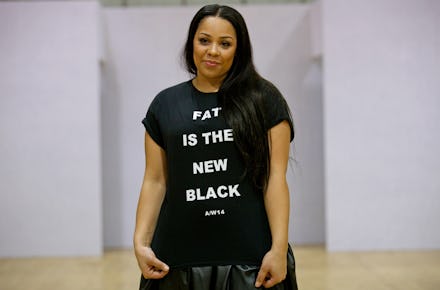When Is It OK to Use the Word "Fat"? Check This Handy Cheat Sheet

The stigma that surrounds fat in the U.S. is as American as the apple pie we're all too ashamed to enjoy.
We spend $60.5 billion annually on diets promising to get rid of it. Our first lady has devoted significant time and resources to combatting it. Shaming celebrities for having any on their bodies has become something of a cultural pastime. We throw the word "fat" around casually, often to put ourselves or someone else down.
But is "fat" so cut and dry? Is it possible to use the word "fat" positively, without insulting someone? Here are the questions you can ask yourself to determine when it's OK to use this charged term.
Should you use the word fat to:
1. Describe a feeling?
No!
This notion that fat is a negative emotion is constantly reinforced in our culture. On Facebook, for example, one could, until recently, say they feel fat just as they would say they're feeling "amazed" or "discouraged." But fat is not a feeling, and doesn't deserve to be associated almost exclusively with negative emotions.
Spoken word poet and body-positive activist Caroline Rothstein summarized why we shouldn't use the word "fat" this way in a recent BuzzFeed video, saying, "When I feel fat, I know that means I'm feeling something else and it's worth figuring out what that is."
So instead of saying you "feel fat," think about what you really feel instead.
2. Shame someone?
No!
When people say they "feel fat," they usually mean they feel ashamed about the way they perceive (or think others perceive) their bodies. It's no wonder studies have found being obese increases the risk of being bullied when cultural representations in reality TV shows like The Biggest Loser and advertisements everywhere encourage shame for being overweight.
But all this weight-shaming doesn't encourage people to lose weight: A 2013 study showed fat-shaming may actually make people gain, not lose, weight. Furthermore, it may impede individuals' overall health. Another study found that because some doctors have an anti-fat bias, many overweight people forego medical treatment altogether for fear of being shamed.
Calling somebody fat with the intention of shaming them into losing weight does nothing other than reinforce a harmful cultural norm. And really, why is anyone else concerned with someone else's weight to begin with?
3. Justify discriminating?
No!
One study showed that size discrimination is the fourth most prevalent form of discrimination in America. It may only gain ground too: The rate of such reported bias has increased by more than 50% between 1996 and 2006.
This discrimination isn't just morally troubling, but also has financial implications. According to one study, workers "who are heavier than average are paid $1.25 less per hour than their thinner counterparts," and will earn as much as $100,000 less before taxes over a 40-year career.
The only metric that should dictate a worker's value is the merit of their work — regardless of whether the bodies they inhabit are "fat."
4. Determine whether or not someone is healthy?
No!
Some say they comment on others' weight out of concern for their health. Yet studies show that popular indications of one's health as related to their size, such as body mass index, don't always paint a full picture of what it means to be healthy. On the contrary, many factors beyond weight contribute to a person's health, such as metabolism, cholesterol, and physical ability, according to Dr. Frank Hu, professor of nutrition and epidemiology at the Harvard School of Public Health.
While obesity can be an indication of poor health, using the word "fat" as a synonym for "unhealthy" is simply inaccurate. It is possible to be technically overweight and healthy.
5. Describe someone who self-identifies as fat?
Yes!
Here's what fat isn't: Fat is not a feeling, inherently shameful, the grounds for discrimination or necessarily an indication of one's health or practices surrounding their health.
Fat is a component in all human bodies. It is natural and biologically necessary. Using the word "fat" in a way that's divorced from these negative influences is acceptable — and a practice that plenty of activists embrace.
"Being unafraid of the word 'fat' has made me realize how often I used to keep silent about the matter to avoid being associated with the word, as if my fatness were a secret!" Lillian Bustle, a burlesque dancer who spoke of embracing the term "fat" in a TED Talk, told Mic in an email.
So how can we ultimately move past the cultural norm that upholds "fat" as a dirty word? Bustle has some thoughts. "Let's ask each other why the word has so much poison and talk about our experiences," she said, "and not let the word shame us into silence."